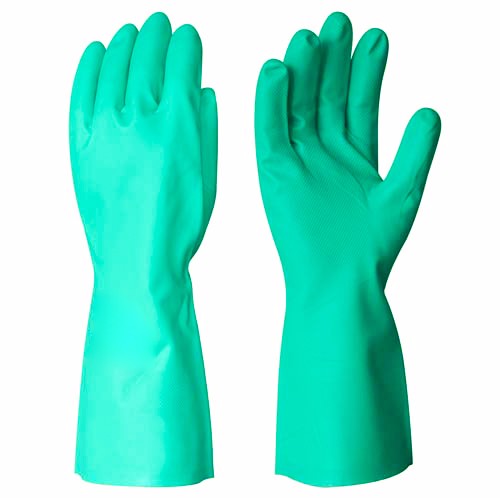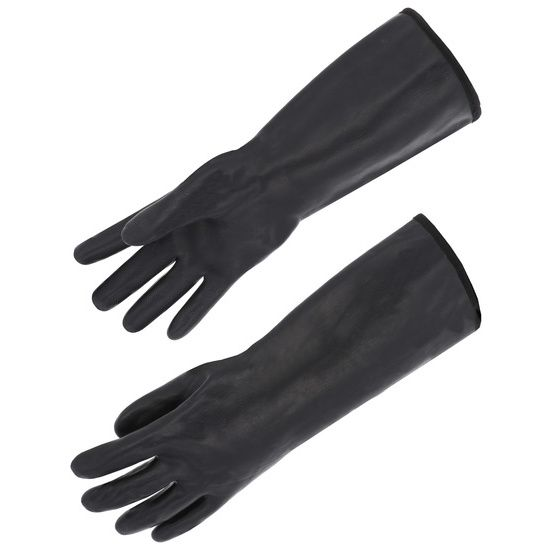When working in hazardous environments, it is crucial to wear the correct Personal Protective Equipment (PPE) to ensure your safety. Gloves are one of the essential safety measures. Regardless of the type of work, wearing gloves can effectively protect your hands, preventing unnecessary accidents caused by exposure to dangerous chemicals.
Without a doubt, latex gloves are one of the most commonly chosen options. However, due to the allergic reactions often caused by latex proteins, they may not be suitable for everyone.
Studies show that in the U.S., 8% to 17% of individuals who frequently use latex gloves may develop an allergic reaction. Therefore, it’s important to explore alternative glove options, which we will comprehensively introduce below.

Nitrile Gloves
Nitrile gloves are one of the most common alternatives to latex gloves. They are made from synthetic materials created by polymerizing butadiene and acrylonitrile. Since nitrile gloves do not contain latex proteins, they do not cause allergic reactions like latex, making them very popular among people allergic to latex.
Compared to latex gloves, nitrile gloves are more durable and chemical-resistant. They provide excellent protection at all times, with good flexibility and puncture resistance. They are also elastic, which allows for a better fit and improves tactile sensitivity. Therefore, when choosing gloves, most people prefer nitrile gloves.

Applications of Nitrile Gloves
Nitrile gloves offer strong resistance to foreign substances, particularly chemically corrosive materials. Their excellent elasticity allows them to withstand significant force without being pierced, making them suitable for use in food processing, medical facilities, chemical industries, laboratories, and other sectors requiring hand protection.
In general, many medical-grade gloves are made from nitrile.

Neoprene Gloves
Neoprene gloves are made from polychloroprene, a synthetic rubber produced by free radical polymerization. They are highly flexible and offer excellent chemical resistance. These gloves protect against harmful environmental factors such as oils, flames, heat, and abrasions, as well as against chemical harm from substances like hydraulic oils, alcohols, gasoline, and alkalis. However, they are ineffective against organic acids.
Compared to natural rubber, neoprene offers better resistance to degradation, meaning these gloves have a longer lifespan as an alternative. They can be used in various industries, including industrial chemical processing, printing, refining, automotive spray shops, agriculture, and environmental cleaning.

Applications of Neoprene Gloves
Neoprene gloves resist sunlight, weather, oxidation, ozone, aging, CFCs, and weak acids. As a result, they are ideal for use in cold conditions and are suitable for a wide range of tasks. They are also very comfortable to wear and allow for excellent finger movement. Additionally, neoprene gloves are highly flexible and durable. Even when stretched or deformed, they can easily return to their original size.
Note: Although neoprene gloves are a useful alternative in some cases, they also have limitations. When choosing gloves, you should consider the specific tasks and environment in which you’ll be working.

Butyl Gloves
Butyl gloves are made from a copolymer of isobutene and isoprene. These gloves can withstand a wide range of industrial chemicals, including corrosive acids, alkalis, ketones, and other irritating chemicals. They also provide excellent grip and protect hands from gases and water vapor penetration.
In chemical environments, if you need an alternative to latex gloves, butyl gloves can be a great option. They offer resistance to various industrial chemicals used in production. Their toughness makes them suitable for heavy-duty work, while their flexibility allows for detailed tasks.

Applications of Butyl Gloves
Due to their better cost-effectiveness compared to other gloves, butyl gloves can be reused without breaking apart, making them an economical solution for many industrial applications. They are durable, resistant to various chemicals, and can be reused multiple times. If you need to work in a chemical environment and protect your hands, disposable gloves might not be the best option.
Why Aibon is the Best Choice for Rubber Glove Alternatives
In environments where you regularly handle hazardous materials, choosing the right gloves is crucial for safety and protection. While latex gloves are a common choice, they may cause allergic reactions and are not suitable for many people. This is where Aibon comes in. We provide a range of high-quality latex glove alternatives, including nitrile, neoprene, and butyl gloves, as well as work gloves to help you choose the right gloves, ensuring that you get the best protection at an unbeatable price.
For those looking for reliable, safe latex glove alternatives, Aibon will be your top choice. Visit our website or contact us today to explore our wide selection and enjoy incredible offers.
How to Measure Glove Sizes – Source: AIBON
Latex gloves– Source: AIBON
Safety gloves– Source: AIBON
Working gloves– Source: AIBON

